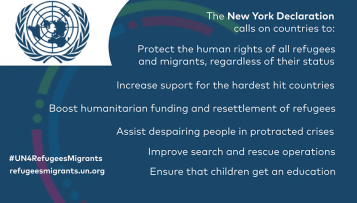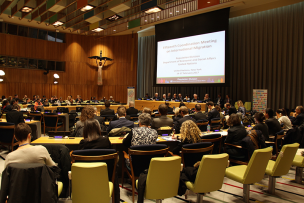“Five months ago, the General Assembly came together to address the issues associated with large movements of refugees and migrants,” UN DESA’s Under-Secretary-General Wu Hongbo said in his opening remarks to the meeting, which was held on 16-17 February.
“The result was the New York Declaration for Refugees and Migrants […], which set us on a path to develop a global compact for safe, orderly and regular migration, to be adopted at an intergovernmental conference on international migration to be held in 2018,” Mr. Wu said.
 The two-day event held at UN headquarters in New York covered a wide range of topics vital to addressing today’s migration challenges and to alleviate the hardship of millions of people on the move. Discussions evolved around the next steps to implement the New York Declaration, preparations of the global compact for safe, orderly and regular migration, human rights dimensions and social inclusion as well as implementing the migration-related commitments of the 2030 Agenda.
The two-day event held at UN headquarters in New York covered a wide range of topics vital to addressing today’s migration challenges and to alleviate the hardship of millions of people on the move. Discussions evolved around the next steps to implement the New York Declaration, preparations of the global compact for safe, orderly and regular migration, human rights dimensions and social inclusion as well as implementing the migration-related commitments of the 2030 Agenda.“You gather at a crucial time, with hundreds of millions of people affected by the issues at stake. We cannot fail them; we must work [more] closely than ever before,” conveyed Secretary-General António Guterres in his message delivered by Mr. Wu.
“Migration is a pressing global issue that should not be viewed solely as a problem but rather as a potential solution to many of the challenges we face today. In the current atmosphere of rising xenophobia, it is essential to have a clearheaded understanding of the facts,” Mr. Guterres said.
Mr. Guterres stressed that human rights must guide our work; that we need to address the root causes of displacement; and that realizing the 2030 Agenda for Sustainable Development must be a top priority.
“We must forcefully reject discrimination […]. It is important to respond to misrepresentations with truth and replace fear with hope. That is the aim of our TOGETHER campaign, which deserves wide support,” Mr. Guterres said.
 In his message, the Secretary-General also highlighted the important contributions of migrants to development. “Migrants often perform critical jobs and send remittances to their families in what amounts to a major contribution to development,” he said.
In his message, the Secretary-General also highlighted the important contributions of migrants to development. “Migrants often perform critical jobs and send remittances to their families in what amounts to a major contribution to development,” he said.The positive impact of migrants was also something that Bela Hovy, Chief of the Migration Section in UN DESA’s Population Division highlighted in a Facebook live interview in connection with the event.
“Today, the amount of remittances that migrants are sending back is over 400 billion dollars each year,” explained Mr. Hovy, describing how this money is used “to send children to school, to improve housing, to have better access to water, to healthcare”.
“[…] [T]hese are all development goals. So what we see is that migration and the remittances it generates, contribute to the development goals that the Member States have agreed upon.”

